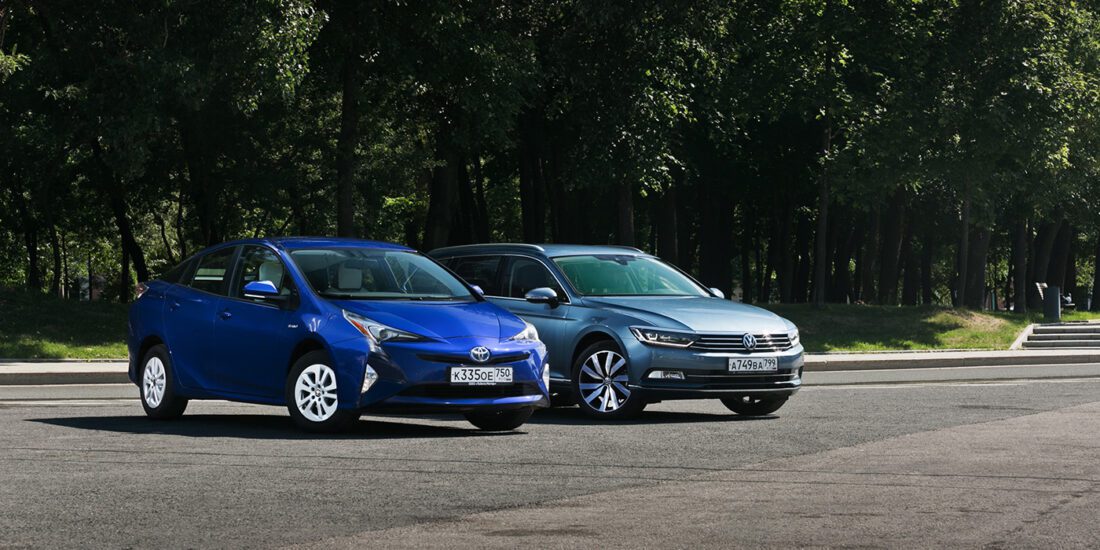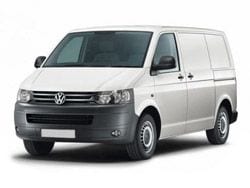
Test drive Toyota Prius vs diesel VW Passat
The diesel engine is going through a difficult time, but will hybrids be able to take advantage of the situation and finally supplant it? We ran the simplest profitability test
It all started with Dieselgate - it was after him that they looked differently at engines running on heavy fuel. Today, even in Europe, the future of diesel is being questioned. First of all, because of the high content of nitrogen oxide in the exhaust of such engines, and secondly, because of the high cost of their development. To comply with the Euro-6 environmental standards, complex systems for cleaning crankcase gases with urea are introduced into the design, which seriously increase the price.
But in Russia everything is different. Environmental issues, alas, are of little concern to us, and against the background of constantly rising fuel prices, diesel engines with their low consumption, on the contrary, are beginning to look more and more attractive. Hybrids can now boast of high fuel efficiency, which, against the background of a diesel engine, seem even more harmless. We decided to test this in a confrontation by comparing the hybrid Toyota Prius with the Volkswagen Passat 2,0 TDI.
The Prius is the very first production hybrid on the planet and has been in production since 1997. And the current generation is already the third in a row. In other markets, the Prius is offered in several versions, including a plug-in version, in which the battery on board can be charged not only from the generator and recuperation system, but also from the external mains. However, in our market only a basic modification with a closed power system on board is available.

In fact, such a machine is structurally no different from the very first Prius at the end of the last century. The car is driven by a hybrid power plant arranged in a "parallel circuit". The main engine is a 1,8-liter aspirated gasoline engine, which, for greater efficiency, is also transferred to work on the Atkinson cycle. It is assisted by an electric motor generator integrated into the automatic transmission and powered by an optional lithium-ion battery pack. The battery is charged both from the generator and from the recuperation system, which converts the braking energy into electricity.

Each of the Prius engines can work both by itself and in combination. For example, at low speeds (when maneuvering in the yard or parking), the car can move exclusively on electric traction, which allows you to not waste fuel at all. If there is not enough charge in the battery, then the gasoline engine turns on, and the electric motor starts working as a generator and charges the battery.

When maximum traction and power is required for dynamic driving, both engines are turned on at the same time. By the way, the Prius's acceleration is not so bad - it exchanges 100 km / h in 10,5 seconds. With a total power plant of 136 hp. this is a decent indicator. In Russia, the STS indicates only the power of the gasoline engine - 98 hp, which is very profitable. You can save not only on fuel, but also on transport tax.
Volkswagen Passat against the background of the Prius stuffed with technological filling - holy simplicity. Under its hood is an in-line two-liter turbodiesel with a return of 150 hp, paired with a six-speed DSG "robot" with a wet clutch.

Of the technological toys that allow you to save fuel, there is perhaps a Common Rail and Start / Stop power system, which itself turns off the engine when it stops in front of traffic lights and automatically starts it.
But this is enough to provide the "Passat" with phenomenal efficiency. According to the passport, its consumption in the combined cycle does not exceed 4,3 liters per “hundred”. This is only 0,6 liters more than the Prius with all its filling and complex design. And do not forget that the 14 hp Passat more powerful than Prius and 1,5 seconds faster in acceleration to "hundred".

The start and finish of an impromptu eco-rally with a length of almost 100 km was accepted for refueling, so that at the end of the route we would have the opportunity to receive data on fuel consumption not only from on-board computers, but also by measuring by the refill method at the gas station.
After refueling cars on Obruchev Street until the tank was full, we drove onto Profsoyuznaya Street and moved along it to the region. Then we drove off the Kaluzhskoe highway onto the A-107 ring road, which is still called "betonka".

Further along the A-107 we drove until the intersection with the Kiev highway and turned towards Moscow. We entered the city along Kievka and then moved along Leninsky until the intersection with Obruchev Street. Returning to Obruchev, we completed the route
According to the preliminary plan, about 25% of our route was to run along city streets in heavy traffic and dense traffic jams, and 75% - along free country highways. However, in reality, everything turned out differently.

After refueling and zeroing the data in the on-board computers of both cars, they easily slipped through Profsoyuznaya Street and escaped into the region. Then there was a section along the Kaluzhskoe highway with the maintenance of the cruising speed at the level of 90-100 km / h. On it, the Passat flight computer began to display data as close as possible to the passport data. On the other hand, the Prius's fuel consumption began to rise, as his gasoline engine threshed all this section without a break at high revs.

However, then before going to the "betonka" we got into a lingering traffic jam due to repair work. Prius got into its native element and almost the entire part of the route crawled on electric traction. The Passat, on the other hand, began to lose the advantage it had gained.
In addition, we had doubts about the effectiveness of the Start / Stop system in such driving modes. Still, it allows you to save a lot when stopping in front of traffic lights, and in such a sluggish traffic jam, when the engine is turned on and off almost every 5-10 seconds, it only loads the starter and increases the consumption from frequent starting ignitions in the combustion chambers.

In the middle of the section on the A-107, we made a planned stop and changed not only the drivers, but also the positions of the cars. The Prius now set the pace at the start of the column, and the Passat followed.
The Kievskoe highway turned out to be free, and Volkswagen began to make up for the lost advantage, but this section was not enough. Having entered the city, we again found ourselves in a sluggish traffic jam on Leninsky and moved in this mode along Obruchev Street up to the final point of the route.

At the finish line, we got a small error in the odometer readings. Toyota showed a route length of 92,8 km, while Volkswagen achieved 93,8 km. The average consumption per 100 km, according to on-board computers, was 3,7 liters for a hybrid and 5 liters for a diesel engine. Refueling gave the following values. 3,62 liters fit into the tank of the Prius, and 4,61 liters into the tank of the Passat.
The hybrid prevailed over the diesel in our eco-rally, but the lead was not the largest. And don't forget that the Passat is bigger, heavier and more dynamic than the Prius. But this is not the main thing either.

It is worth looking into the price lists of these cars to make a final conclusion. With a starting price of $ 24. Passat for almost $ 287. cheaper than the Prius. And even if you pack the "German" with options to the eyeballs, it will still be cheaper by $ 4 - $ 678. On the Prius, while saving 1 liter of fuel for every 299 km, it will be possible to level the difference in price with the Passat only after 1 - 949 thousand kilometers.
This does not mean that the Japanese victory is worthless. Of course, hybrid technologies have long proven their worth to everyone, but it is still too early to bury a diesel engine.
| Toyota Prius | Volkswagen Passat | |
| Body type | Liftback | Universal |
| Dimensions (length / width / height), mm | 4540/1760/1470 | 4767/1832/1477 |
| Wheelbase, mm | 2700 | 2791 |
| Ground clearance, mm | 145 | 130 |
| Curb weight, kg | 1450 | 1541 |
| engine's type | Benz., R4 + el. mot. | Diesel, R4, turbo |
| Working volume, cubic meters cm | 1798 | 1968 |
| Power, hp with. at rpm | 98/5200 | 150/3500-4000 |
| Max. cool. moment, Nm at rpm | 142/3600 | 340/1750-3000 |
| Transmission, drive | Automatic transmission, front | RCP-6, front |
| Maksim. speed, km / h | 180 | 216 |
| Acceleration to 100 km / h, from | 10,5 | 8,9 |
| Fuel consumption, l | 3,1/2,6/3,0 | 5,5/4,3/4,7 |
| Cargo space, l | 255/1010 | 650/1780 |
| Price from, $. | 28 978 | 24 287 |
